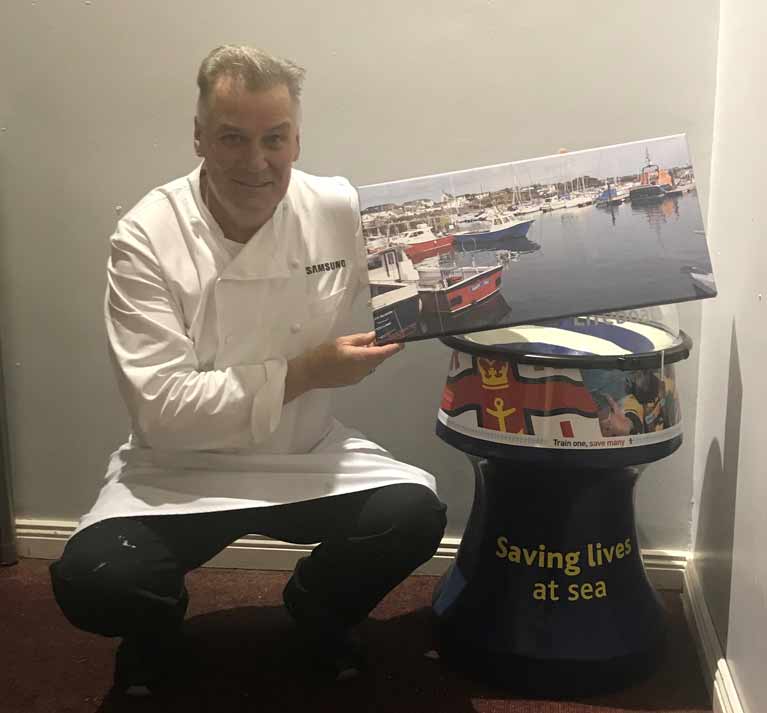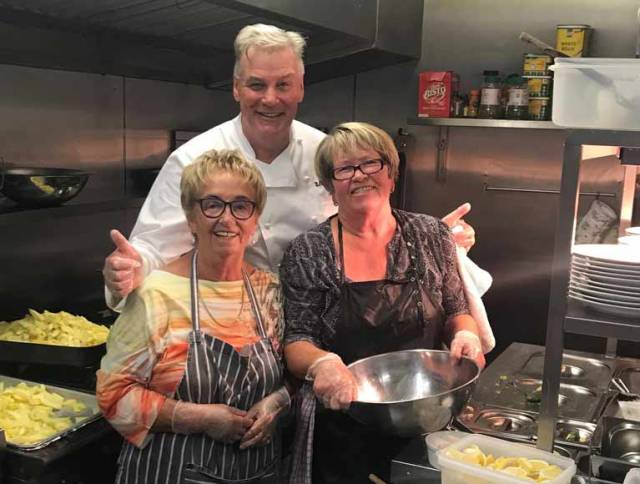The great and the good of Kilmore Quay turned out on Friday night (18 October) last weekend to dine on a fish supper with a difference which raised €2,518 for saving lives at sea. Overseeing the cooking was Michelin Star Chef Derry Clarke, who had travelled down from his famous restaurant in Dublin, L’Ecrivain. Derry and a small number of volunteers served up suppers of fresh fish, chips and mushy peas to 120 lucky people who had packed into the Stella Maris Community Centre. The night was held to raise funds for Kilmore Quay RNLI and was part of the charity’s Fish Supper campaign.
Derry has a great love of the sea and is lifesaving charity’s official ‘Fish Supper Ambassador’. He often shares delicious fish recipes on the RNLI website for people to use when holding their own fish supper for the lifeboat crews. He has held RNLI fundraisers in both West Cork and Wexford in the past and was delighted when he received a call from Kilmore Quay RNLI Treasurer Anne McMorris to ask if he would host a fish supper in the village to raise funds for the lifeboat crew.
 Derry in Kilmore Quay
Derry in Kilmore Quay
One hundred and twenty portions of fresh fish were donated by O’Flaherty’s Fish along with bags of chips from Fortune’s potatoes. The oil used to cook the dinners was kindly donated by Kehoe’s Pub and Mace gave the wine at a generous reduction. The kitchen volunteers worked alongside Derry to ensure the guests had a delicious and hot meal served to perfection and the event was a huge success.
Following the meal, Derry came out to thank the diners and received huge applause. He was presented with a mounted photograph of the local harbour by Kilmore Quay RNLI Treasurer Anne McMorris who thanked him for giving up his time to come down and cook for the guests.
 The great and the good of Kilmore Quay turned out for Derry Clarke and the RNLI
The great and the good of Kilmore Quay turned out for Derry Clarke and the RNLI
Speaking to a packed hall, Derry added, ‘A few months ago I was asked to do a Fish Supper in Kilmore Quay for the RNLI and I couldn’t say no. Both my close friend Paschal Ryan and I keep our boats here in the summer and we have a great love and fondness for the place. It is a beautiful village and the people are so kind. We always have a great time here, as is shown by tonight’s crowd.’
‘I am always delighted to support the RNLI. I know how important a lifeboat is to a community, it brings everyone together. There are a lot of the lifeboat crew here tonight and I want to thank them for everything they do. I would also like to wish the outgoing mechanic, Brian Kehoe, a very happy and well-deserved retirement. He has left an incredible legacy’
When Derry was pressed for the recipe of his fabulous batter, he admitted he had added a lot of beer and a dash of water.
































































